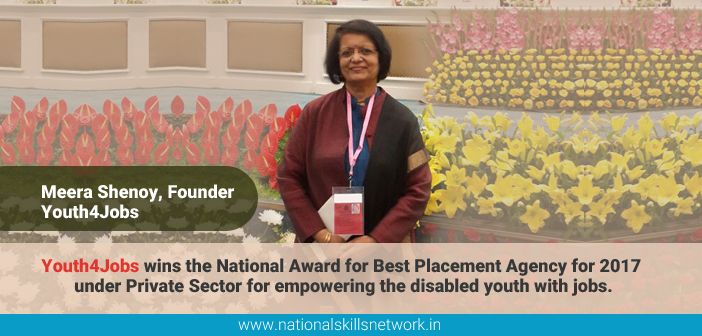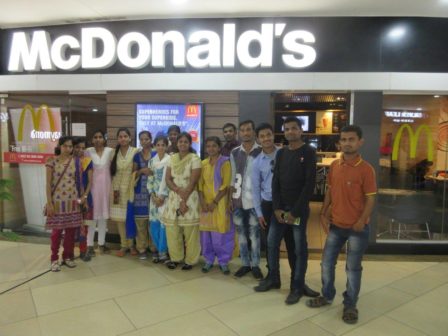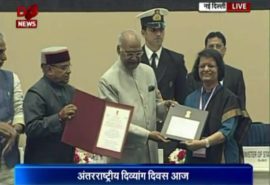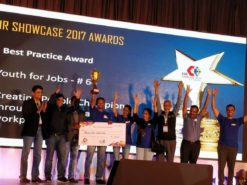When you skill a disabled person and place him or her in a organized sector job, it not only empowers the disabled but also the whole family and the society at large. With this motto, Meera Shenoy, Founder, Youth4Jobs, has been on a mission to mobilize, train and place the disabled youth in India, along with sensitizing the non-disabled about the abilities of these youth and how they can be a workforce to reckon with in many industry sectors. In this Skill Story, let’s get to know more about Youth4Jobs that won the National Award for Best Placement Agency for 2017 under Private Sector for empowering the disabled youth with jobs.
 I set up Youth4Jobs five years ago. I had a simple vision to skill youth with disabilities and to do the last mile connect with jobs. You may wonder why only youth with disabilities? The most important reason is that there is a large population of them; studies show only .001% of disabled youth are connected to jobs. Many of the studies also show a clear connection between disabilities and poverty.
I set up Youth4Jobs five years ago. I had a simple vision to skill youth with disabilities and to do the last mile connect with jobs. You may wonder why only youth with disabilities? The most important reason is that there is a large population of them; studies show only .001% of disabled youth are connected to jobs. Many of the studies also show a clear connection between disabilities and poverty.
The second reason is that 80% of people with disabilities are in the developing countries. So whatever you do in India will not just impact your country but also the entire world. I was equipped with in-depth knowledge about skilling, having started India’s first skilling mission for the state government of Andhra Pradesh. I had also worked in the World Bank and the UN across South Asia in the youth component in the poverty alleviation projects so I did not want to repeat any of that work again. But this knowledge was leveraged for a more vulnerable space.
We decided to begin with youth from villages with at least 30% girls from rural India. As all of us know, 69% of India lives in villages, so if you want to scale up and you want your training centres to run to capacity you should reach those who need it most.
 The challenges and the opportunity
The challenges and the opportunity
The first center was setup in Hyderabad and it had its challenges. We had to coordinate between geographically dispersed youth, mobilize them and get organized. In families where disability was treated as a curse, we had to educate them that the youth can be given training for suitable jobs. Most parents of disabled youth were shocked to here that this was possible. Till now they looked at the disabled son as a useless boy, who was fit for nothing and the daughter was kept hidden in the house as they thought disability has closed all doors for the child and particularly for girls it would be impossible to get married. So, these were the kind of issues we faced in mobilizing the youth.
Now, let me tell you about the employers. These were companies whom we had in our network because of my previous work; when they visited our training centers they were completely aghast. Some of them would ask if they could choose between the disabled and the non-disabled candidates.
That made us even more determined that we should not run the training centres in an inclusive manner but we should keep them only for youth with disabilities so that when companies came they had no choice but to take them. The trainers were mostly government-trained and did not understand the job markets at all. And sometimes the governments give so many subsidies to the youth that their incentive to work and become independent just doesn’t exist. The initial phase was quite a financial struggle as well since we were self-funded.
Our working model for skill based training and placement
We wanted to build a template for scale and we managed to do it with in year by working with youth with locomotor disabilities. We tested this template in Hyderabad and Tirupati and the positive results encouraged us and then we were ready to go! However, our challenge in mobilizing the disabled youth remained. There are many ways to advertise and reach out if your target audience is non-disabled youth. And coupled with that, we had to find companies that are equal opportunity employers. This showed many gaps in the value chain both from the supply-side and the demand-side. We started filling the gaps one by one, for instance the first thing we did was to educate the companies about disability through simple fun-filled interactive games and sensitization workshops where they played a lot of games which actually showed that if one ability gets taken off something else comes into play and you are not fully disabled.
The next important point was demonstrate job fitment for various disabilities. For this, we created job role matrix where we worked closely with the HR teams and the they would share all the available jobs that could be mapped with competencies of the disabled. We demonstrated how disabled youth can perform on such jobs with simple workplace adaptations, for example, for a locomotor or speech and hearing impairment person. Thus, many roadmaps for created for finding suitable placements for these youth. We also take up accessibility audit which helps in aligning software for youth with visual disabilities.
As we worked with multinationals, we realized we needed a new youth pool with better English and smarter. So we just launched “College Connect” to orient youth with disabilities directly in colleges and educational institutions and then link them to jobs.
What success means to a candidate
Let me share a success story about a blind girl from Bihar whose father was working in a cloth mill in Surat, Gujarat. The mill closed down and he was jobless. And this girl was being told that she was blind and she was not allowed to many things. However, she managed to study till 10th standard and to pay her fee she took up some petty jobs. She heard about our training center and enrolled without informing anyone at home. Today she is placed in a retail job and earns about Rs. 1,20,000 per year and she is the only earning member of the family. She runs the house educates her brother, she is the darling of the family and her entire community looks at her with respect. We took her to one of our international retreats and it was simply amazing.
This reaffirms my belief that a job is not just an economic independence it changes the social equations in the entire community suddenly this girl with disability has a white collared job which many of the girls who are non-disabled in the community do not have. This gives her a voice, anytime anyone has any dullness in our retreat she would come up with Shayari (poetry). All along when her parents had discouraged her though she could not see she used to listen to the radio she has an amazing memory learning all these Shayaris but today with her voice she is able to bring these out and its really beautiful.
Portability of skills and multi-skill training
 I firmly believe in the portability skills, I do not believe that we should limit skill training to just one or two job-specific skills but train them in multiple skills. What would happen to someone who is skilled only in folding clothes in the retail sector and he or she loses the job? So, we need equip them with appropriate generic skills like communication, computer basics and other skills that can help become confident to find other jobs. After that, depending on where the jobs are, which is mostly the fast-growing service or manufacturing sector, we give them orientation to the sector with one week on-the-job training. It’s different from what others do which is very skill specific. Our students who were trained 4-5 years ago they move effortlessly from one job to another and many have got into government jobs which they could not before.
I firmly believe in the portability skills, I do not believe that we should limit skill training to just one or two job-specific skills but train them in multiple skills. What would happen to someone who is skilled only in folding clothes in the retail sector and he or she loses the job? So, we need equip them with appropriate generic skills like communication, computer basics and other skills that can help become confident to find other jobs. After that, depending on where the jobs are, which is mostly the fast-growing service or manufacturing sector, we give them orientation to the sector with one week on-the-job training. It’s different from what others do which is very skill specific. Our students who were trained 4-5 years ago they move effortlessly from one job to another and many have got into government jobs which they could not before.
On job reservations for the disabled
The new right to PWD Act passed by the central government last year, is phenomenal because its in line with the UNCPRD and what many other countries haven’t achieved yet. It has some implications on the private sector as they are expected to hire some amount of people with disabilities and report the number. However, the implementation of this Act is in the hands of the state government. The Karnataka Government is working in a positive way while most others haven’t, but at some point of time it will be implemented favourably in all states.
Personally I don’t believe in any kind of reservations because I think if you create a conducive atmosphere for hiring as it makes business sense to hire them. And when productivity is high and attrition is low hiring will automatically happen.
















We are Parents if Pranav Dutt. Pranav is a differently abled boy, aged 22 years. He is identified with mild intellectual disability, coupled with mild fine motor activity deficiencies. We are looking for a job for him, so as to secure his future. We may be advised how to go about. We are from Coimbatore, Tamil Nadu
Hi Devi Dutt, please contact them through email youth4jobs@gmail.com